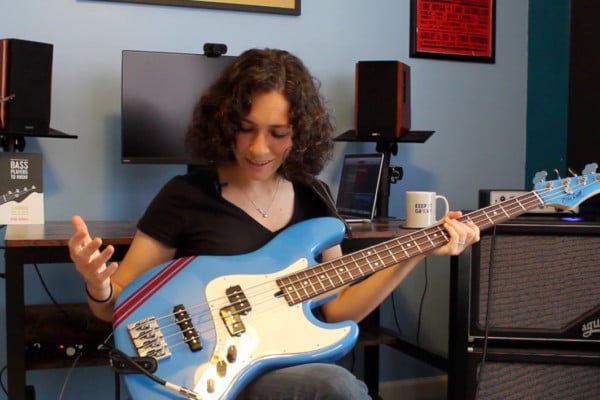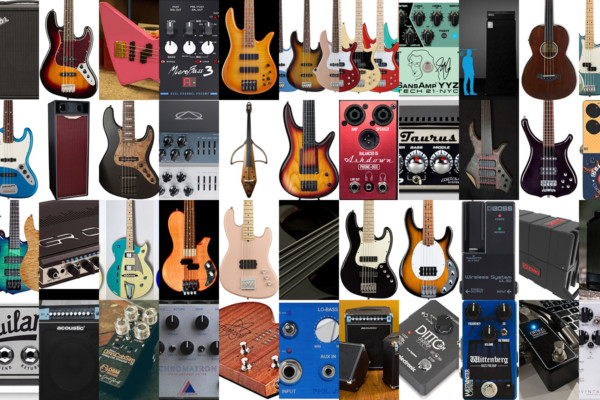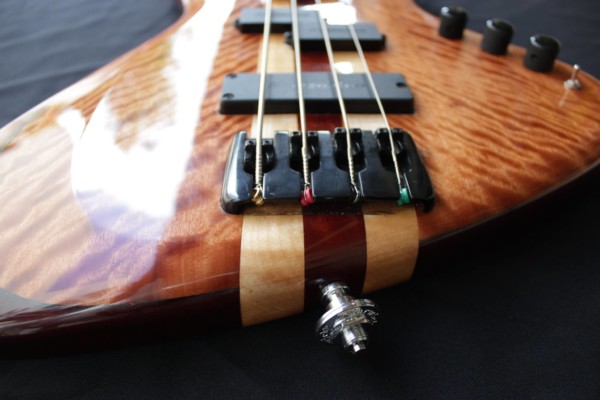Gear, Tone and Reality
Q: I know a lot of guys who spend quite a bit of time and money on their gear. In your opinion, how much of a bassist’s sound is contained in the rig that they are using versus the hands and so on?
A: I’m glad you asked! I just had this conversation the other night, at different times and with different people while at a dinner party held by Janek Gwizdala. Janek and I have noticed a large number of people asking very specific information about gear, strings and amps – not just about how this works or that works, but simply, “What do you use?”-type questions.
We surmised that a large number of people believe that, to some extent, if you buy the amp, bass and use the same strings as your favorite player, maybe you’ll sound a bit like them.
While I think every one of us has been guilty of this line of thinking, let me save you some money.
Buying everything that your favorite player uses will not make you sound any more like them than you already do. The reason many players play what they play has to do with reliability, artist pricing, power needs and – for many – transparency (not coloring the sound so it sounds exactly like… you).
I can remember hanging out with Rich Brown (an amazing bassist in Toronto) at my house and he had brought his bass. Rich has one of my all time favorite electric bass tones. I couldn’t wait to swap basses for a hot second and play his. I wanted to hear that tone under my fingers. To my dismay, I sounded nothing like Rich and sounded practically the same as I did when I had my own bass in my hands.
Very subtle differences at work.
I was so bummed because, in that moment, I truly realized that my sound was actually that: my sound, and not the result of me having the right or wrong gear.
As further proof in the pudding to our “the tone is in your hands” discussion, Juan Alderete (Mars Volta bassist) mentioned how a wrist injury a few years back had completely changed his tone. He simply couldn’t get his hand in the same position that he was used to and it drastically changed his tone because he was forced to pluck from another part of his finger. Same finger, mind you, just from a different angle.
Certainly, if you plug your bass with a flat EQ into 10 different rigs, all set with flat EQ’s, you will get 10 different sounds. They will, however, be 10 different variations on your sound.
When anyone asks me about choosing gear I always suggest that one simply tries out a number of different basses and then play it through a number of different amps and use what speaks to you. Choose the bass by the feel, stability and sound you get out of it. Choose the rig by your needs and requirements (size, power, versatility). Choose the strings you use by how they feel and sound, and how long they last.
And of course, by varying degrees of financial ability. We certainly can’t all afford boutique rigs (see my past article on picking a rig).
I heard someone say once, “we’ve all got different meat and different bones… how could anyone one of us sound alike?”. That’s it in a nutshell. Physiology plays a huge role in your tone. Then there’s how hard we pluck, what fingers we use, what part of our finger we use, and the same goes for the left hand. Even the callouses on our fingers change our sound. How long are your nails? Do they add a click to your (attack) sound on your right hand?
How high you wear your bass will effect what part of your finger you use when playing too.
In short, there are countless variables. If you don’t like your sound, there is a lot of experimentation one can do in order to fully explore the tonal possibilities we possess. What someone else plays should play a role only in the beginnings of your exploration into what gear to use. Use it as a launching board for your experiment, but only use what speaks to you personally in one way or another. Don’t think that buying a Fodera will get you any closer to Janek’s, Garrison’s or Anthony’s level of musicianship. That part is all a matter of blood, sweat, tears and determination.
My advice? Put far more energy into your craft (music) than you do the tools (gear) of the trade and you’re sure to develop a voice all your own and, before you know it, people will be asking you what gear you use.
Have a question for Damian Erskine? Send it to [email protected]. Check out Damian’s instructional books, Right Hand Drive and The Improviser’s Path.




There are most definitely some very distinct characteristics that only gear provides, and they are not always subtle. Fender basses, for example. Whether you love them or hate them, you cannot deny that the four string Jazz and P basses are a staple of modern music, and that they have a highly distinct tonal characteristic that remains consistent, and recognizable, across different players.
While I do agree that most of a musicians unique ‘voice’ on the instrument comes from how he or she plays it, I have to disagree on a certain level – gear makes a HUGE difference in many cases. Not all, but many.
true! I think many folks seem to have a warped perspective on it all, however. My experiences from the forums and from a TON of emails seems to suggest that a lot of folks put themselves last in the equation of tone.
P-basses will definitely sound much different than an MTD, for example. But you will also sound much different on a P-bass than I do. I just want folks to consider themselves in the equation and, possibly, worry less about WHAT gear they play as opposed to how they play and how they approach the music.
I didn’t mean to suggest that anyone could play ANY instrument and get only a slight variance in tone. You’re definitely right on there…
My Uncle, who was a very well known and established bassist in our tristate area, told me when I first started out, HOW you play is just as important as what notes you play.
I heard someone say once, “we’ve all got different meat and different bones… how could anyone one of us sound alike?”.
This is so true! When I was a kid, I played trumpet for 4 years. My tone sucked. I took private lessons, practiced like crazy, did all manner of tone improving exercises and all to no avail. Sadly, I sounded every bit as bad on my friend’s high end trumpet as I did on my starter model. In a moment of frustration I was venting on my band teacher and he finally broke down and told me the truth. There was a very strong possibility that my mouth was just not built to play the trumpet. This must have been a very hard thing for him to do, as he was one of the most positive and encouraging teachers I ever had and I respect him for it. It wasn’t long after that I got my first bass and found a musical outlet that, apparently, I was built for. Thanks again Mr. Otto! :-)
As the symphony players say ” It’s not the violin , it’s the violinist “
Part of the equation is also how close the gear gets to helping you sound like you. I grew up playing a P-bass, but it was never really me, it seemed. Once I move to a J-bass, with its different tonal spectrum, I came alive as a bass player. To this day, regardless of what gear I have with me, I notice that I tend to try to recreate that sound that most fits me.
This is a great subject for discussion. While I agree that your technique is one of the most profound factors, i have yet to come to terms with the amp you use when playing live being much of a factor when the sound tech is going have a major effect on your “sound”. That may be a different discussion altogether.
I understand what you mean when you say that the sound is in your hands but personally I think a players sound is in their ears.
I doesn’t matter what gear I use I’m always trying to pull the same tone out of it anyhow. There are certain kinds of gear which I wouldn’t choose because I just can’t seem to pull my sound that I like. This doesn’t make it bad, it just means it doesn’t work for me.
Having said that I have pulled a great sound out of on some really cheap equipment and been totally underwhelmed by some “boutique” gear. Price is not the only determinant. P.S. Don’t be afraid to mod your gear to get your sound, It’s your voice, you’ll know it when you hear it :)
After many years and several thousand dollars chasing that “phantom” tone in my head, I realized that the author is exactly right. I had played through the same rig and set up for about 3 years and had only recently paid attention to the fact that my tone is dependent on my posture and attack angle. I paid attention to my sound one time when I was playing and thought that I really dug it(is that even correct?). Since then when I feel like my tone sux (and we all have those days) I revert back to the things I was doing that day and BAM! it’s back.
I agree 100% with this article and also Jez’s comments. I have played thru everything and have found what works for me and what doesn’t. One thing I have learned like Jez commented is that I always try to pull the tone im looking for out of every amp I play thru. Playing in NYC clubs you have no choice but to deal with whatever backline is there. Yeah you can lug your own amp but Id rather not unless its an absolute must.
Playing thru a hundred amps and PA systems does teach you something and as time goes on you really strip down to the bare essentials. One thing ive learned is if you cant carry it in one trip you got too much gear.